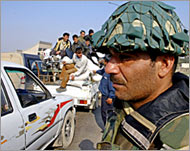Ex-Baathists to get back civil jobs
Iraq’s de-Baathification committee has decided to take a softer stance on giving back jobs to former Baath Party members.

More than 12,000 former members of the party have been or will be reintegrated into public sevice one year after losing their jobs under a policy to punish those “loyal” to the ousted regime, a senior committee official said on Thursday.
“Our committee, which fired 30,000 people, has decided to reintegrate 12,000 who have appealed the decision,” committee director Mithal al-Aallussi said.
“They are from a range of sectors, for example the interior ministry, that of education or electricity,” he explained “Some decided to restart active work and others chose retirement.”
The committee is a body created and headed by Ahmad al-Chalabi.
One-year probation
In a statement, signed by al-Chalabi and released in Iraqi newspapers on the same day, the committee said it has “accepted the request for certain sections of the Baath party to be reintegrated into public office and in business and the state.”
They will be on one-year probation, the document explained, adding that “certain people in the number released by the newspaper must appear before the de-Baathification committee and finish preparing the necessary paperwork before they can restart work.”
 |
|
The wide-scale purges put many |
Some 694 names released by the media on Thursday were all of teachers from Baghdad and the Muslim Sunni governorate of al-Anbar to the west, notably al-Ramadi and the Iraqi resistance stronghold of Falluja, which saw heavy fighting in April, and became the only Iraqi city free from US forces.
The reinstated workers, however, were all low down in the Baath party and al-Allussi said no members of the party’s top three ranks would ever work in the civil service again.
Fall out
The softer stance on former party members followed al-Chalabi’s alleged fall from favour in a head-on collision with his former US allies last month.
US and Iraqi forces raided al-Chalabi’s offices amid a swirl of allegations that he had handed US spy secrets to Iran.
Even before the run-in with Chalabi, US overseer Paul Bremer reversed the policy in late April, after deciding al-Chalabi’s de-Baathification committee had been too severe in handing out judgements.
Bremer’s move had sparked a sharp reaction from al-Chalabi, who compared the move to bringing back the Nazis after World War II.
|
“We must also affirm the need to try criminals in courts to be punished for the injustice they committed and to allow the Baathists, who did not violate the law, to live in dignity and as part of the community” Iyad Allawi, |
When Bremer arrived in Iraq one year ago, he sided with al-Chalabi and issued a decree expelling all senior Baathists from the administration and dissolving the armed forces.
The policy was the result of al-Chalabi’s fierce wrangling with his well-placed friends in Washington at the expense of Bremer’s predecessor Jay Garner, who saw administrating the war-torn country was the priority, not a witch hunt.
The de-Baathification committee fired 30,000 civil servants, including 6,000 teachers.
The wide-scale purges, along with the dissolution of the Iraqi army, aggravated unemployment and stoked the flames of attacks against the Americans.
Acknowledging the damage done by the policy, the US-led coalition, along with the UN, picked a former senior Baathist Iyad Allawi to be Iraq’s first post-Saddam prime minister.
Allawi favours hiring back old military officers and civil servants not tainted by the “crimes of Saddam’s regime”.
In his first direct address to the Iraqi people last week, Allawi waved the olive branch to former Baathists.
“We must also affirm the need to try criminals in courts to be punished for the injustice they committed and to allow the Baathists, who did not violate the law, to live in dignity and as part of the community,” he said.
In that direction, UN envoy Lakhdar Brahimi publicly advocated last week those with ties to the anti-US occupation attacks be brought into the country’s political dialogue.